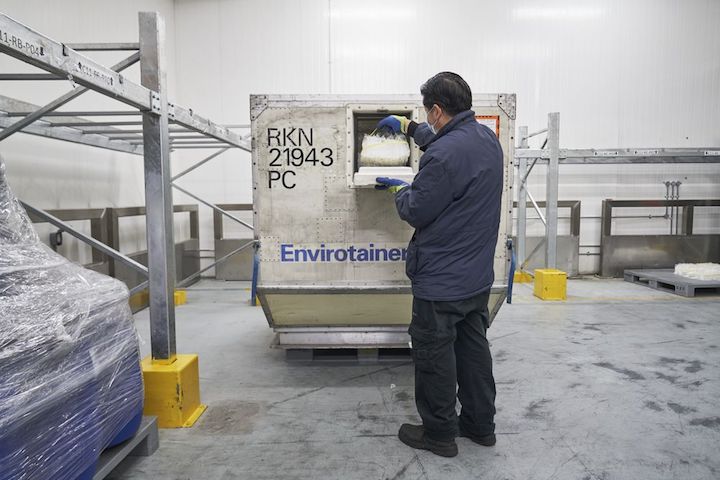Singapore’s Changi gets ready with tons of dry ice for vaccines
In balmy Singapore, a tiny island nation that sits almost directly on the equator, it’s usually flowers, meat and seafood that gets whipped away into SATS Ltd.’s cool rooms upon landing at Changi Airport. Now one of the world’s biggest ground handlers is gearing up for a more vital task.
Like cargo operators everywhere, SATS is preparing for the arrival of its first shipment of vaccines from Pfizer Inc. and BioNTech SE later this month. Prime Minister Lee Hsien Loong said this week that the country, which has a population of around 5.5 million, should have enough vaccines for everyone by the third quarter. Multiple bets have been placed, with Moderna Inc. and Sinovac Biotech Ltd. jabs lined up as other potential candidates.

In anticipation, SATS has doubled production of dry ice needed to keep the Pfizer vaccine at the required storage temperature of minus 70 degrees Celsius. The company has also purchased two cool dollies, like giant freezers, to move the vaccines around on the ground.
“SATS will play an essential role in taking the vaccines off the planes, storing them at a low temperature and then sending them to the forwarders who will then take them to market,” Chief Executive Officer Alex Hungate said.
And it’s not just Singapore. SATS will play an important role in getting the vaccines out to cities including Beijing, Jakarta, Mumbai, he said.
SATS Coolport may also be enlisted by hospitals to store some vaccines if they don’t have the necessary facilities. A temperature-cooled container will need to be packed with up to 100 kilograms of dry ice to transport the Pfizer vaccines.
While airlines—the workhorses that will move billions of vials all around the globe—swing from a Covid-induced idleness into action, ground handlers like SATS have been busy throughout the pandemic.
SATS handled 15% more pharmaceutical cargo by weight in the first seven months of this year versus the same period of 2019; daily production of dry ice meanwhile will now rise to around 4.5 tons—about the size of a large adult male hippopotamus.
Similar Stories

United Airlines fourth quarter profit ahead of expectations
View Article
Cathay Pacific releases traffic figures for December 2024
View ArticleXeneta announces Board of Director changes, supporting the transformation of ocean and air freight markets
Xeneta, the global reference for ocean and air freight rate data and intelligence, has announced changes to its Board of Directors. Marie-Pierre Rogers has been appointed as the new Chair,…
View ArticleNAV AERO strengthens global reach with Oman Air Cargo Partnership
NAV AERO Global Cargo GSSA Network is proud to announce its partnership with Oman Air Cargo, a leading carrier recognized for its innovative solutions and exceptional service. This collaboration underscores…
View Article
AHS/Menzies uses Lödige Industries’ automated ULD storage System at the Queen Alia International Airport, Jordan
View Article
Challenge Group signs with AERCAP for two converted 777-300ERSF, the ‘Big Twins’
View ArticleGet the most up-to-date trending news!
SubscribeIndustry updates and weekly newsletter direct to your inbox!





